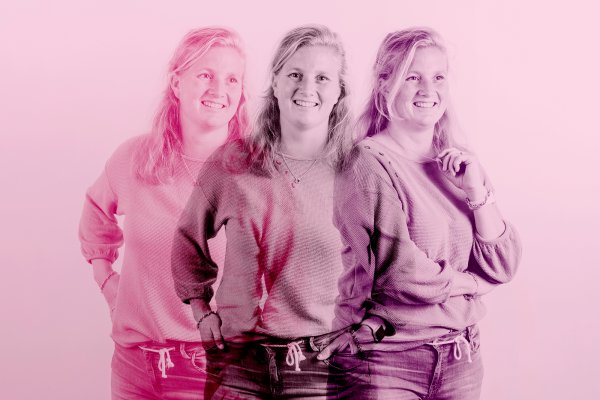-
12 januari
Annemieke de Vries: 'Coaching is more fun than lecturing'

Talent-oriented and coaching education: it might also catch on in other places, Annemieke suspects. But first things first. Annemieke works in Den Bosch, where she and her colleagues train pedagogues who are going to work at, for instance, a welfare organisation, a neighbourhood team, a hospital, a school or a day-care centre.
Old education
Pedagogy decided to organise education differently because the teaching profession and what is asked of pedagogues has changed. Annemieke: 'The old education, the so-called learning curve curriculum, had fixed components such as lectures, working lectures and skills training. After ten weeks, students had to show that they had mastered the material. We can say you were learning to pass an exam.'
According to Annemieke, the new 'learning group curriculum' appeals much more to students' own responsibility. 'You don't become a pedagogue by studying a book. You learn the profession in practice. That is why we have abolished lectures and seminars and interwoven practice much more explicitly into our education. The students now largely make their own programme. They determine their own assignments and ask for feedback on their 'individual workplace' - what we used to call 'internship'. Of course, we do expect a certain knowledge base from the students; they work on competences based on the national training framework.'

Talent-based education, according to Annemieke, is a constant stream of feedback and 'assessment as learning'. An additional advantage is that this system gives peace of mind. Both the coach and the student know at any time during the semester whether the student will get his credits at the end, because he includes his coach in the development process.'
Questions from practice
The curiosity of pedagogues-in-training sometimes leads to questions, so-called pedagogical issues, to which no one has the answer. 'Not even the professional field. In other words, our students are working on practical questions, together with the professional field. That way, students obtain relevant knowledge, fed by practice.'
If there are no more lectures, how do students acquire the necessary theoretical knowledge? Annemieke: 'The students have to meet competences such as: "I sense educators in their system, context, living situation and respond to them diversity-sensitively." When they read that, they need to know what we mean by system, context and diversity sensitivity. Then they will look for literature or someone who can talk about it. With supporting documents, they have to show quality, for example in the form of feedback by an expert.'
More personal education
Annemieke herself likes coaching much more than lecturing. 'Before, students went on internships and were busy achieving professional tasks. What they learned was already determined for them. Nowadays, students go to their individual workplace (formerly internship) and there they review and decide for themselves what they want to learn, matching the competences. Another difference: I used to lecture about a hundred students. Now I coach nineteen. I know all of them by name. I also know the students from the other groups. Teaching has therefore become much more personal.'
Talent-oriented education does not lead to better pedagogues, according to Annemieke. 'But it does lead to different pedagogues. Educators who fit in these times. Who are assertive, take responsibility and dare to stand up for themselves. I myself only learned to give feedback to colleagues when I started working. Our students already give strong feedback to each other if they think one of them is cutting corners. They have self-knowledge. We see them budding before our eyes'.
Those who provide talent-oriented education must dare to trust, Annemieke knows from experience. 'If a project does not run smoothly at the beginning, as a teacher - I mean: as a coach - you tend to make adjustments. You have to be cautious about that. You have to let it happen sometimes. Often, the group itself realises at some point that it needs to change strategy. It is important that they come to that realisation themselves.
